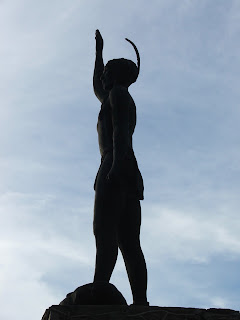
Some of you have expressed interest in learning a little bit more about the Gemini Art writer. I'm not too keen on the idea of having a devoted reader turn into a stalker so I won't divulge any personal information. But, I'll be happy to tell you a little of my background and influences.
Yesterday I had the chance to drive through a little community that played a brief but influential role in my childhood, Caddo Gap. Several members of my extended family lived there, worked there, went to church or school there at some time in their lives. At one time Caddo Gap was a vibrant and thriving little logging and farming community that had its own school, post office and a smattering of stores. I believe it was at its climax during the 30's, 40's, and 50's (no I wasn't alive back then).
 My memories of the place come from times my grandmother took me there. It was handy to stop by the Caddo Gap Mercantile if you were going fishing in the Caddo River. You could pick up snacks, sodas, fishing tackle and fish bait. I still have a little straw cowboy hat my grandmother purchased for me at Caddo Gap when I was around 14 years old. That was in the mid 80's. By that time the Caddo Gap school had been closed (since 1971) and consolidated with other small towns. Our country was beginning to make "progress". We learned to shop at Wal-Mart, self-serve gas stations were cheaper than full-service, and convenience stores became more convenient than the Caddo Gap Mercantile. The drips and drops of income from Reagan's trickle-down economics never reached Caddo Gap. As a matter of fact, it dried up altogether.
My memories of the place come from times my grandmother took me there. It was handy to stop by the Caddo Gap Mercantile if you were going fishing in the Caddo River. You could pick up snacks, sodas, fishing tackle and fish bait. I still have a little straw cowboy hat my grandmother purchased for me at Caddo Gap when I was around 14 years old. That was in the mid 80's. By that time the Caddo Gap school had been closed (since 1971) and consolidated with other small towns. Our country was beginning to make "progress". We learned to shop at Wal-Mart, self-serve gas stations were cheaper than full-service, and convenience stores became more convenient than the Caddo Gap Mercantile. The drips and drops of income from Reagan's trickle-down economics never reached Caddo Gap. As a matter of fact, it dried up altogether.Now all that remains of the little community that used to be Caddo Gap are the skeletal shells of old store fronts and the lone proud figure of the Caddo Indian monument (more about the Caddo Indian in later posts).
 A small but well-tended park and garden mark the spot where the old school had been. No doubt the park was placed there by some of the hundreds of former students that had grown up there and called her their alma mater. The sidewalks bear the names of the graduates as a testament to the contribution made by this little forgotten place.
A small but well-tended park and garden mark the spot where the old school had been. No doubt the park was placed there by some of the hundreds of former students that had grown up there and called her their alma mater. The sidewalks bear the names of the graduates as a testament to the contribution made by this little forgotten place.Let's not delude ourselves into thinking that our current progress has made everything better. Let's also weigh that progress against what we have lost. We don't start school everyday with the noble ritual of students lining up around the schoolyard flagpole to say the pledge of allegiance before we start the day. Schools are so large that teachers only know a fraction of the students on campus. And modern professional decorum looks down on the possibility of teachers and students sitting together at lunch just to visit and get to know one another better. Credit is handled by the impersonal whirring of machines chewing on plastic rather than a handshake and promise between a customer and merchant that, "I'll pay you back after pay day." These days we put cranky old men in "retirement homes" rather than let them sit on the storefront benches to compete over who gets to open a door for a lady or carry her groceries to her car.  We don't miss their tobacco spit on the sidewalks but young mothers would enjoy having these old cusses back to tussle with the toddlers on the porch while she picks up a few things for dinner. The simple pleasure of fishing has been perverted into the sport of angling. Most "serious" fishermen need an expensive boat and thousands of dollars worth of equipment to do the same job we used to do with a cane pole and a bucket of worms. Our lakes are so toxic and laws so strict that we have to throw back most of what we catch and buy commercially raised, hormone laden Chinese fish from Wal-Mart. Plastic pop bottles have made it safer to drink a cold drink than the dental chipping glass we used to pull from a machine for a single coin. But, little boys across the country have lost their jobs and tiny income by not having glass bottles to collect and return to support their soda pop habit.
We don't miss their tobacco spit on the sidewalks but young mothers would enjoy having these old cusses back to tussle with the toddlers on the porch while she picks up a few things for dinner. The simple pleasure of fishing has been perverted into the sport of angling. Most "serious" fishermen need an expensive boat and thousands of dollars worth of equipment to do the same job we used to do with a cane pole and a bucket of worms. Our lakes are so toxic and laws so strict that we have to throw back most of what we catch and buy commercially raised, hormone laden Chinese fish from Wal-Mart. Plastic pop bottles have made it safer to drink a cold drink than the dental chipping glass we used to pull from a machine for a single coin. But, little boys across the country have lost their jobs and tiny income by not having glass bottles to collect and return to support their soda pop habit.
 We don't miss their tobacco spit on the sidewalks but young mothers would enjoy having these old cusses back to tussle with the toddlers on the porch while she picks up a few things for dinner. The simple pleasure of fishing has been perverted into the sport of angling. Most "serious" fishermen need an expensive boat and thousands of dollars worth of equipment to do the same job we used to do with a cane pole and a bucket of worms. Our lakes are so toxic and laws so strict that we have to throw back most of what we catch and buy commercially raised, hormone laden Chinese fish from Wal-Mart. Plastic pop bottles have made it safer to drink a cold drink than the dental chipping glass we used to pull from a machine for a single coin. But, little boys across the country have lost their jobs and tiny income by not having glass bottles to collect and return to support their soda pop habit.
We don't miss their tobacco spit on the sidewalks but young mothers would enjoy having these old cusses back to tussle with the toddlers on the porch while she picks up a few things for dinner. The simple pleasure of fishing has been perverted into the sport of angling. Most "serious" fishermen need an expensive boat and thousands of dollars worth of equipment to do the same job we used to do with a cane pole and a bucket of worms. Our lakes are so toxic and laws so strict that we have to throw back most of what we catch and buy commercially raised, hormone laden Chinese fish from Wal-Mart. Plastic pop bottles have made it safer to drink a cold drink than the dental chipping glass we used to pull from a machine for a single coin. But, little boys across the country have lost their jobs and tiny income by not having glass bottles to collect and return to support their soda pop habit.Perhaps we have sacrificed too much in our rush toward progress. Maybe we should have found compromises that would have helped us hang on to our fading heritage.


No comments:
Post a Comment